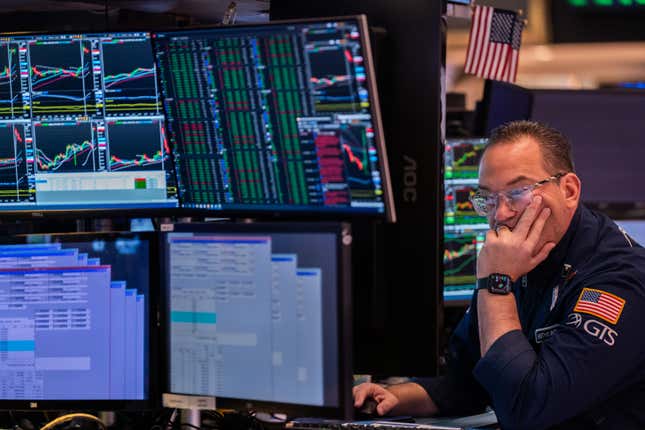
Good morning, Quartz readers!
Here’s what you need to know
Tariffs are bad for business. More than two-thirds of CEOs think there will be an economic slowdown in the next six months.
Goldman Sachs posts a profit pop, but keeps one eye on the storm ahead. CEO David Solomon stayed bullish, even as he warned of a “markedly different” environment.
Trade war puts TikTok on the clock. The social media app has become an economic bargaining chip amid tariff-related chaos involving the U.S. and China.
Ray Dalio thinks it’s time to buckle up — and batten down. The hedge fund billionaire says the president’s trade war could bring about “something worse than a recession.”
Palantir stock goes boom, not bust, with NATO deal. One analyst thinks the defense contractor will benefit from a “tidal wave” of government spending on AI.
Pfizer pulls the plug on its weight loss pill. A liver injury to a patient means the pharma giant will need to figure out a different Ozempic challenger.
Unemployment fears hit post-pandemic highs
If you think the job market is starting to feel a little less secure lately, you’re not alone.
According to a Fed survey released Monday, Americans’ sentiment around unemployment and inflation all declined month-over-month.
According to the central bank’s March 2025 Survey of Customer Expectations, people’s outlook on whether the probability that unemployment will be higher a year from now climbed 4.6 percentage points (to 44%) — the highest level since April 2020. The perceived probability of losing one’s job within the next year reached its highest mark since March 2024.
Fears about the U.S. economy extend beyond the job market. The average perceived probability that stock prices will be higher a year from now dropped to almost 34%, the lowest level since June 2022. Survey respondents also expected to be in a worse financial situation a year from now and think inflation will be higher. Quartz’s Kevin Ryan unpacks the economic angst.
Red, white — and GPU
Nvidia is going to start building its AI supercomputers in the U.S. The tech giant and chip manufacturer announced Monday that it will begin manufacturing stateside for the first time.
In a blog post, the company said it has commissioned more than a million square feet of manufacturing space in Arizona and Texas. Production of its AI supercomputers will happen in factories in Houston and Dallas.
Mass production is expected to ramp up there in the next 12-15 months. Meanwhile, over in Phoenix, the company has already started churning out its Blackwell chips. Silicon Valley? More like Silicon Southwest.
Nvidia also said it plans to invest $500 billion in AI infrastructure in the U.S. over the next four years through various manufacturing partnerships. Quartz’s Kevin Ryan has more on Nvidia going full stars and stripes.
More from Quartz
🍎 Apple stock jumps after Trump announcement
🚗 Auto stocks get a boost from the president, who wants to “help some” of them
🏈 A top Fed official uses the “Tush Push” to explain inflation from transitory tariffs
🤖 These 7 AI breakthroughs could reshape everyday life
🍔 These QSRs are offering deals to make your Tax Day a sweet — not sour — one
Our best wishes on a safe start to the day. Send any news, comments, and more to talk@qz.com.